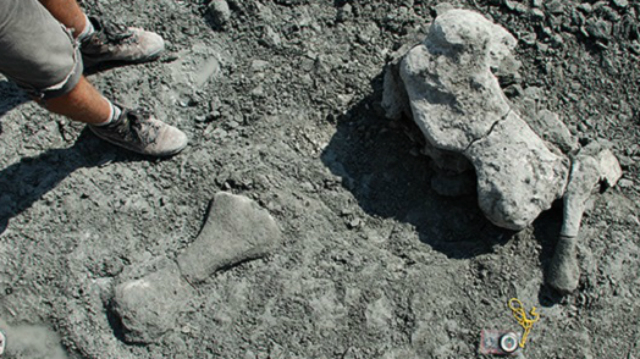Fossil of giant ‘mammal-like’ prehistoric reptile found in Poland
Experts say the previously unknown species may change our understanding of evolutionary history

A free daily email with the biggest news stories of the day – and the best features from TheWeek.com
You are now subscribed
Your newsletter sign-up was successful
The discovery of fossilised remains of an enormous prehistoric reptile in southern Poland has revealed that dinosaurs weren’t the only massive creatures roaming the planet 200 million years ago.
The fossil has been identified as a previously unknown variant of dicynodont, part of the therapsid group which are the ancestors of all modern mammals. The new species has been named Lisowicia bojani, after the German anatomist Ludwig Heinrich Bojanus and Lisowice, the village near the discovery site.
The animal has been described as a cousin to the mammal, and is thought to have been an heribove with smooth skin and no teeth, somewhat similar to a hippo in appearance, says New Scientist.
The Week
Escape your echo chamber. Get the facts behind the news, plus analysis from multiple perspectives.

Sign up for The Week's Free Newsletters
From our morning news briefing to a weekly Good News Newsletter, get the best of The Week delivered directly to your inbox.
From our morning news briefing to a weekly Good News Newsletter, get the best of The Week delivered directly to your inbox.
Its enormous size - standing as tall as an African elephant and weighing up to nine tonnes – could alter our understanding of evolutionary history, as scientists have previously thought dinosaurs were the only animals to reach this size during the Triassic period. Other dicynodonts discovered in the past have been no larger than a cow.
“It’s natural to want to know how dicynodonts became so large. It blows holes in many of our classic ideas of Triassic ‘mammal-like reptiles’,” said Dr Grzegorz Niedzweidzi, part of a team from Sweden’s Uppsala University who assisted the excavation.
In addition to being the largest known non-dinosaur tetrapod, or four-legged animal, from the Triassic period, “Lisowicia is the youngest dicynodont” yet discovered, he added.
Most dicynodonts, along with other mammals, are thought to have retreated during an extinction period before the emergence of dinosaurs, and the Polish fossil is the first substantial find linking dicynodonts to the Late Triassic period in Europe.
A free daily email with the biggest news stories of the day – and the best features from TheWeek.com
Dr Tomasz Sulej of the Polish Academy of Sciences told The Independent that the new species was “a once-in-a-lifetime discovery”.
More than 1,000 prehistoric find have been made in and around Lisowice, which is thought to have been a river deposit during the Late Triassic period.